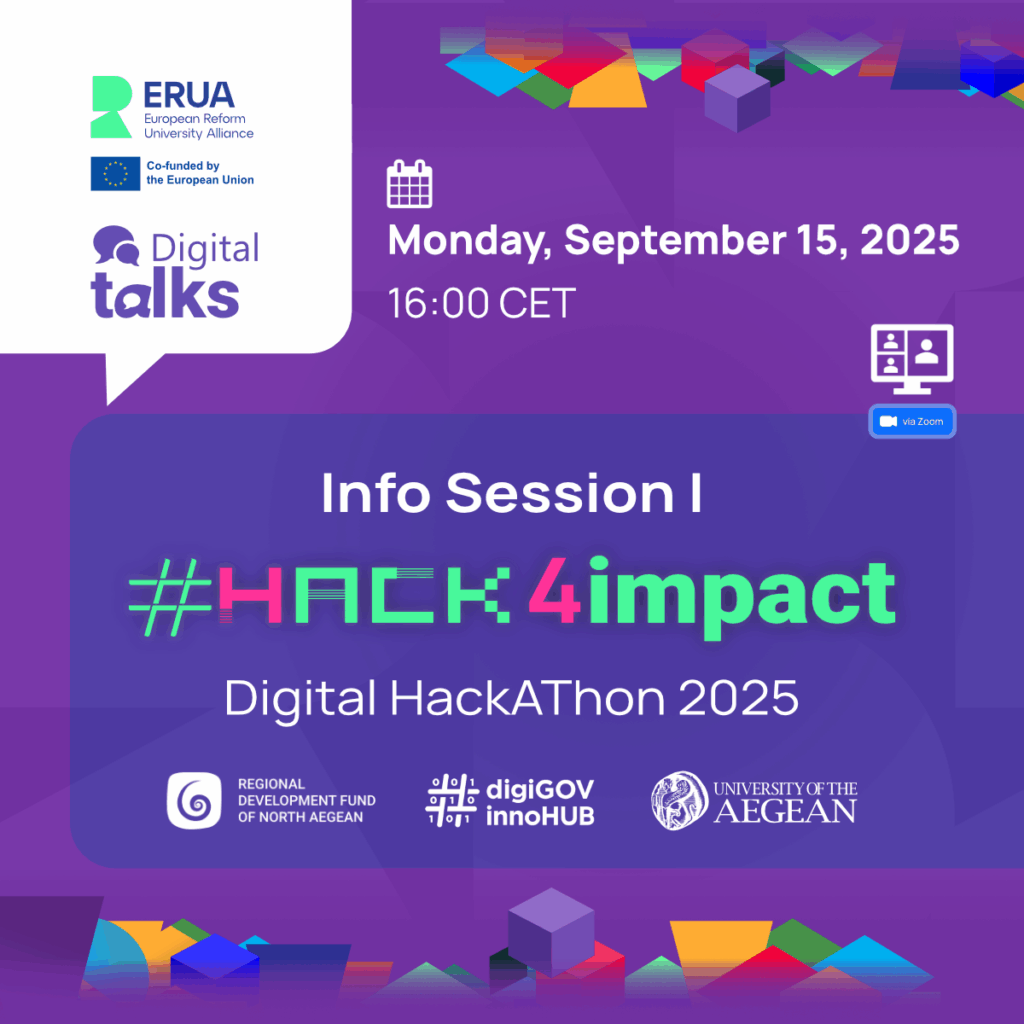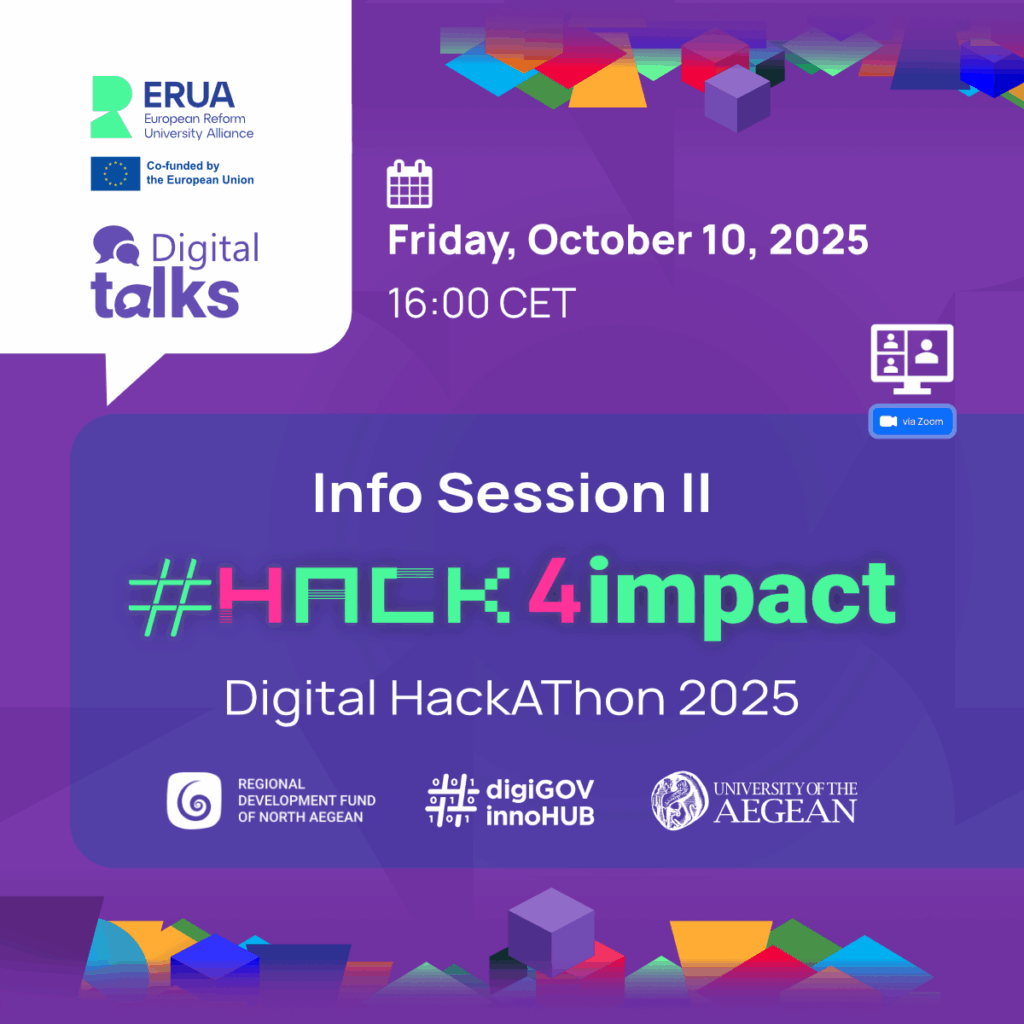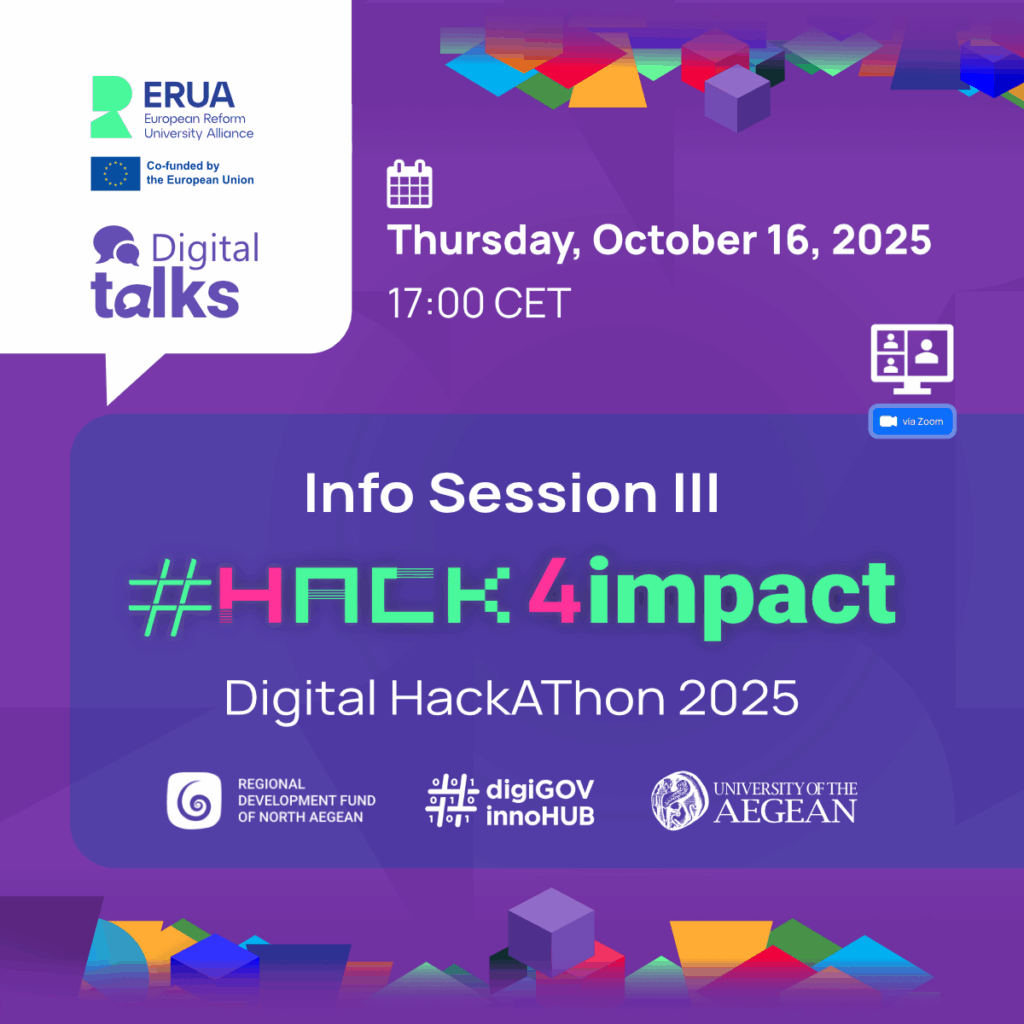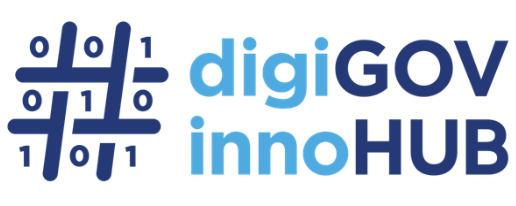Objective
Hack4impact is a Digital Hackathon that connects entrepreneurship (including social) with digital public sector reforms, skills and alignment with the SDGs (Sustainable Development Goals). This approach showcases a unique, first-of-its-kind collaboration among the European Reform University Alliance (ERUA), the North Aegean Regional Development Fund and GR digiGOV-innoHUB.
Hack4impact Challenges are linked to:
- Regional needs (digital transformation, emerging skills’ needs & inclusive growth)
- ERUA’s core goals (university-led reforms, social entrepreneurship)
- EU priorities (public sector reform, digital transition, SDGs, creative and interregional knowledge communities)
- And ERUA thematic areas:
- Environmental Transition
- Democracy and Human Rights
- Interculturality and Multilingualism
- Migration
- Arts & Edges
Hack4impact is also related to other ERUA ongoing actions:
- The #ERUAiDeaThon2024 on alternative entrepreneurship, which explored ideas around migration, inclusion, democracy, and gender equality
- The ERUA Social Entrepreneurship Course, which developed over 45+ business plans and and strengthened solutions based on regional needs.
- Monitoring the Sustainable Development Goals (SDGs) for sustainable regional policy and the ERUA Creative and Interregional Knowledge Communities.
| Now Hack4impact takes the next step: from Idea to Prototype – & – from Prototype to Business Creation |
Hack4impact aims to:
- Encourage collaboration between universities, civil society, and public authorities in prototype development & start-up creation.
- Support university-led reforms/tools in public services and regional development
- Promote digital innovation in regional governance
- Provide a launchpad for entrepreneurial business ideas & social entrepreneurship responding to SDGs implementation & creative interregional knowledge communities.
Hack4impact expects: Operational Prototypes & Business ideas
Key Partners & Roles
- North Aegean RDF: Regional policy guidance, alignment with regional development needs and mentoring.
- ERUA Alliance: Participant activation, university mentoring, evaluation and dissemination of resuts, collaboration with ERUA Social Entrepreneurship Lab.
- GR digiGOV-innoHUB: Technological mentoring, digital governance knowledge and platform, connection with the Interoperable Europe Platform (Joinup) https://interoperable-europe.ec.europa.eu/
Who Can Participate?
- Participants from the ERUA community (students, researchers and staff from the 8 ERUA universities – interdisciplinary, cross-regional teams are encouraged)
- Individuals & technology start ups
- Teams and individuals from the #ERUAiDeaThon2024 and the Social Entrepreneurship Course (teams with ready-made solutions/ team creation will be supported after initial registration).
- Social Entrepreneurs and innovators from all ERUA regions
Hack4Impact expects that participants (individuals, teams or start-ups) to prepare:
- The problem & the proposed solution & the Hack4Impact challenge(s) that fits into.
- A presentation or video pitch (e.g. ppt, business model canvas, prototype, code)
- Collaboration with mentors (if necessary).
Hack4impact uses: Digital tools accessible to all participants.
Hack4impact Toolkit
| Function | Tool |
| Registration | Eusurvey |
| Team Formation | Slack |
| Communication | Slack / Zoom – channels by proposal/team |
| Pitching | Zoom & possibly livestream |
| Submission | Eusurvey + external repositories |
| Website | Information website |
Hack4impact applies confidentiality rules/procedures for all participants.
Hack4impact Challenges
Challenge 1: Building tomorrow’s talent economy based on regional skills gaps
Turning persistent skills mismatches and gaps in digital training and its documentation (starting in ERUA member regions), into opportunities & ideas for new businesses. Participants are invited to identify local barriers to human resources and training and design innovative, scalable business models – through startups, cooperatives, or social enterprises – that will fill these gaps through technology-enabled, inclusive, and regionally tailored services.
Ideas May Include:
- Platforms for regional skills forecasting, documentation, and employment connection
- AI applications for professional development and reskilling, tailored e.g. in rural, island or migrant communities
- EdTech solutions that bridge the education-employment gap in underserved areas
Objective:
Creating startups or social enterprises that will turn skills into a regional advantage, opening up new possibilities in education, training and digital employment – especially where traditional systems lag behind.
Challenge 2: Better Governance of the Public Sector through Inclusive Digital Reforms
Reforming the way public services interact with citizens and regional communities, by proposing/launching prototypes and startups (problem solving) – including social enterprises or cooperatives – that support participatory governance, democratic innovation and inclusive reforms in services.
Ideas May Include:
- Development of an LLM-based chatbot with user authentication functionality, enabling retrieval and correlation of project payment data from organizational databases and public portals
- Digitalization & AI tools for regional governance reforms
- Startups and/or prototypes offering automation and digital transformation tools
- Open source solutions for public sector data management and/or transparency tools
Objective
Enhance the development of entrepreneurial ecosystems around regional public sector innovation, where universities act as prototype development hubs and startups (including social entrepreneurs) become drivers of democratic participation and inclusive regional reforms.
Challenge 3: Inclusive and Sustainable Development through implementing University Excellence
Designing entrepreneurial ventures based on the top SDGs identified by the universities of the ERUA Alliance, transforming academic strengths into innovative development models that meet real social needs. The challenge connects the academic mapping of the SDGs in which ERUA excels, with entrepreneurial (including social entrepreneurship) action, transforming knowledge aligned with curricula into startups that serve local communities, regions and global needs.
Ideas May Include:
- Innovative data tools addressing inequality, gender inclusion, or migration (SDGs 5, 8,10)
- Civic-tech platforms that promote democratic participation or trust in institutions (SDG 4, 8,16)
- SDG-based advisory services to support regional authorities in transforming and implementing public policies (SDGs 4, 13, 17)
Objective:
To leverage the existing strengths of ERUA universities’ curricula on specific SDGs, to create entrepreneurship or solutions that connect universities with society, enhance social responsibility and expand social impact at regional and global levels.
Hack4impact Timeline

Phase 1 – Pre-Hackathon Prep (September 2025)
- September 2025: Open call for participation
- September 2025: Stakeholder and mentor recruitment
- September 2025: Digital collaboration platform setup
- Sept 15, 2025 Info event I (DigiTalk)
- Oct 3, 2025: Hackathon Idea Submission deadline
- Announcement of evaluation results
- Oct 10, 2025: Info event II / Training & team matching (DigiTalk)
- Oct 16, 2025: Info event III / Training & team matching (DigiTalk)
Phase 2 – Hackathon Execution (October 2025)
- Sept 30 – Oct 20: Final Prototype development & mentorship
- Oct 22-23: Final Hackathon Presentations (2 days)
- Oct 30 : Awards announcement
Phase 3 – Follow-up (from November 2025)
- Showcase winning projects – Connection with ERUA SUMMIT25
- Connect top teams to EU pilot programs, incubators, or regional support opportunities
- Publish outcomes
- Connection with 2027 ERUA Hackathon
Important notes
- Each team/presenter will have 20 minutes in total; 10 minutes to present and 5-10 minutes for questions.
- Presentations should be conducted in English, regardless of the original language of submission, for Challenges 1 & 3. For Challenge 2, it is also preferable to be in english.
- All candidates are kindly requested to provide a title and short description of their proposal in English, if not already submitted.
- Any additional material (e.g. videos, presentation files, etc.) can be sent to erua-eui@aegean.gr , though this is not mandatory.
- Additional material does not need to be submitted before your presentation day or slot; what matters most is your live participation during the assigned session.
- The proposed template presentation acts as a barebones structure to help you keep all sections handy; you may use any kind of visual appearance or additional material such as videos or images, as long as you keep within your 10-minute presentation timeframe.

Hack4impact “Info Session I”
Learn more about Hack4impact by participating in this DigiTalk – Info Session.
Monday, September 15, 2025, from 16:00 to 17:00 CEST!

Hack4impact “Info Session II”
Learn more about Hack4impact by participating in this DigiTalk – Info Session.
Friday, October 10, 2025, from 16:00 to 17:00 CEST!

Hack4impact “Info Session III”
Learn more about Hack4impact by participating in this DigiTalk – Info Session.
Thursday, October 16, 2025, from 17:00 to 18:00 CEST!
Awards & Recognition
There is a prize of 2000 euros for the winning proposal in each category. Content regarding the Hack4impact proposals, teams and meetings may be shared on the ERUA, the North Aegean Regional Development Fund and GR DigiGOV-innoHUB communication channels.
Evaluation Criteria
All the #Hack4impact proposals will be evaluated based on the criteria below.
| RELEVANCE EFFECTIVENESS FEASIBILITY | PROJECT TEAM | SCALABILITY | INTERACTION WITH END USERS |
|---|---|---|---|
◼ Creative thinking & Originality, ◼ Relevance with the call ◼ Feasibility of the expected results ◼ Technical readiness Effectiveness of the proposal | ◼ Scientific Expertise ◼ Technical Expertise ◼ Market expertise ◼ Sector Expertise ◼ Public sector expertise ◼ Ability to work together | ◼ Ability to be implemented to other wider activities in the same sector (differentiation) ◼ Ability to be implemented to other wider activities in another sector (diversification) | ◼ Citizen/end-user groups involved ◼ Experience in working with citizens/end-users |
For more information, please read the detailed Terms & Conditions.






